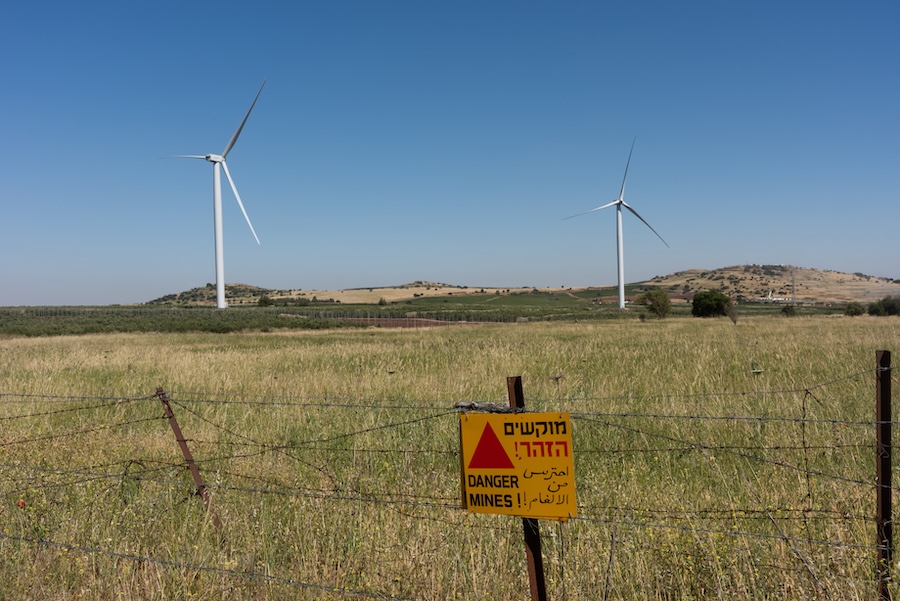Israel’s climate tech sector plummeted in 2023
The war and infighting over Netanyahu’s moves wreaked havoc on the country’s sustainability startups. Read More

Wind turbines generate renewable geothermal energy on a mountain top in northern Israel. Photo courtesy of Shutterstock/Yehoshua Halevi
Funding for Israel’s climate tech sector experienced a massive dropoff in 2023. The first half of the year saw a 60 percent decline in venture capital investment, to just $551 million, compared to 2022. The second half of 2023 had only 13 deals, totaling $96.07 million, according to data from Pitchbook.
Investors reduced funding in the first half — and many Israeli startups moved operations out of the country — after Prime Minister Benjamin Netanyahu’s government introduced a controversial bill that weakened the powers of the country’s supreme court.
Until 2023, Israel’s climate tech sector had seen massive growth. Data from the Israel Innovation Authority showed an increasing number of climate tech startups each year — 2022 saw a total of 694 startups, while 2023 saw an increase to 784. In 2022 alone, the Israeli climate tech sector raised $2.5 billion — ;a record for the country’s fledgling industry.
As outside money fled, so did many startups, who moved people and operations outside the country. Some of them lost workers or loved ones in the Oct. 7 massacre by Hamas. Others are operating on an emergency basis, with minimal staffing. Employees have been called up to fight in Gaza. Executives have been forced to move their families abroad.
“Many of our customers — or potential customers — are Israeli,” said Zvika Klier, CEO of Tigi Solar, “and when we call them and want to talk with them about renewable heat, some of them say, ‘My team is in the reserve army and we’re only doing what’s urgent, and if it’s not urgent, we’re not doing it.’”
As a whole, global funding for the climate tech sector took a hit in 2023, down a total of 50 percent year-over-year after a period of remaining relatively insulated from external factors. This likely contributed to Israel’s plummet in climate tech funding.
“Eighteen months ago, climate tech was not a thing in Israel,” Uriel Klar, director of PLANETech, told GreenBiz last year, “and [in 2022] there are 700 startups and a record $2.5 billion in investments.”
Then, in early October, Hamas attacked Israel, killed 1,200 people, kidnapped 240, and started a war that has claimed a further 23,000 lives — and has yet to end.
In the wake of the Hamas attacks, 300,000 Israelis — many from within the sector — were called into reserves by the Israeli Defence Forces. Others were forced to manage their businesses with a depleted workforce and staff in mourning for the dead.
Because of the instability of the domestic market, Klier said, Tigi Solar is instead focusing its sights on Europe for overseas partnerships.
“One of our business development directors lost her brother [in the attacks],” said Dots.Eco co-founder and chief growth officer Daniel Madrid. “So that has been really heartbreaking for her, of course. She has not been able to come back to work, mentally.” Dots.Eco is an online platform that rewards online gaming milestones with real-life ecological conservation, like planting trees, removing plastic from oceans, or coral reef preservation.
Madrid decided to relocate his entire family to France, citing his pregnant French wife as the catalyzing factor. “I had plans to move to Paris with my wife and [newborn]…in August of next year [2024], but this situation precipitated everything.”
The official numbers for Israel’s climate tech sector in the second half of 2023 are sparsely reported. Net Zero Insights, a platform that updates global climate tech deals in real-time, currently has Israel at 50 deals, totaling $175.26 million. The discrepancy between Pitchbook and Net Zero Insights’ numbers are likely due to each platform’s definition of the term “climate tech.” Either way, neither one paints a prosperous picture for Israel.
Israel’s climate tech industry is largely dependent upon Western sources for funding — 48 percent of corporate and venture capital funding is non-Israeli, with the bulk coming from U.S.-based corporate venture capital sources, including Microsoft, Amazon and Bayer.
“The Israeli and American market are very much interconnected, at least when it comes to climate innovation,” said Gideon Behar, Israel’s special envoy for climate change and sustainability, to GreenBiz during COP28.












